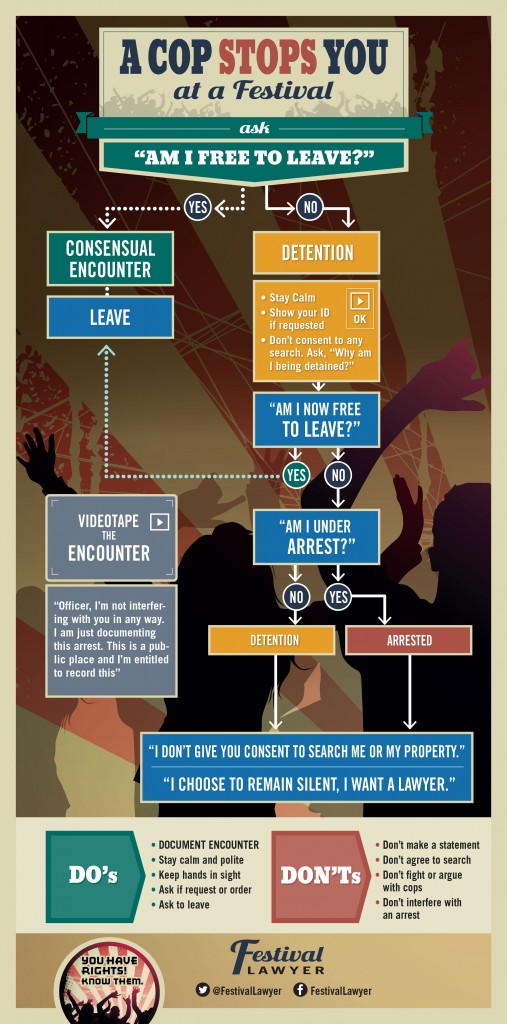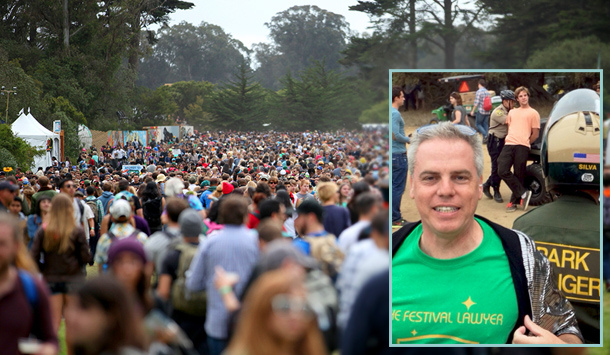
OFF THE WIRE
SHARE THIS KNOWLEDGE WITH OTHERS
People often suggest to me that either 1) It’s somehow “Un-American” to talk about your rights when dealing with the police or that 2) Somehow only someone who is intending to break the law would need to understand their legal rights.
As to 1) This is really some dangerous nonsense. In fact this honestly might be one of the craziest ideas that has ever taken root in our Country and as to 2) As I always say “It’s better to know your rights and not need them, than to need your rights and not know them.”
The accompanying article goes into an overview of some 4th Amendment law in more detail. But really the infographic is meant to be shared even without the article. Feel free to share this infographic on Twitter and Facebook. Tag family members or friends who might be going to a music festival. Share your experiences and insights. Do more reading of your own and share that too.
As the very last part of the infographic says
You have rights. Know them
Ed. Note: The Following breaks down the Festival Lawyer’s infographic in more detail:
The “Know Your Rights” infographic – A Police encounter “Flow Chart”
A lot of people write me asking how they should have handled a negative encounter they had with the police at a music festival or rave.
I keep hearing phrases like, “I wish I had known that I didn’t have to make a statement” or “I didn’t know I could say no” or “I wasn’t sure if I had a right to leave or if the cop was detaining me.”
The fact is that you DO have rights in dealing with the police. The “Know Your Rights” infographic is meant to be used as a practical flowchart of what your rights are at every stage of a police encounter.
A COP “STOPS YOU” AT A MUSIC FESTIVAL
The 4th Amendment of the Constitution prohibits “unreasonable” searches and seizures. That means you are supposed to have a right as a citizen to freely go about your business without being randomly detained or investigated. In order to “stop” you, an officer first has to have a belief that you were engaged in criminal activity.
There are 3 levels of police “stops”. At each higher level of police encounter, the police officer has to show more justification as to why he stopped you.
Consensual Encounter – A police encounter where you are not the subject of a police investigation and are free to leave. Officers don’t have to legally justify a consensual encounter because you can leave at any time.
Detention – A police encounter where you are temporarily stopped while the police investigate you for a crime. Officers must have a “reasonable suspicion” that you were involved in criminal activity to detain you.
Arrest – Permanently stopped and on your way to jail. An officer must have “Probable Cause” to believe you committed a crime to arrest you.
You know how H20 can be in three different physical states? (Steam, water and ice if you don’t have your 4th grade science notes handy) Well, the 3 levels of police stops are similar. Each of these levels is sort of a different legal “state” of being. And your rights are different in each of these “states”.
There are some big differences of course. In the H20 example you end up with an ice cube. In the police stop final state you end with a cell mate named “Bubba”.
One of the main goals of the infographic is to give you the right questions to ask so that you will know at any time which level of police “state” you are in. (Get it? police state? See what I did there?).
AM I FREE TO LEAVE?
If you are stopped by a police officer, the first question out of your mouth should be, “Am I free to leave?”
Asking this question gets you an immediate answer as to whether you are legally “detained” or free to leave. It also puts you in the best legal position possible should you later want to challenge the legality of the police stopping you. If you challenge your detention, the officer will have to show a “reasonable suspicion” of criminal activity basedonly on the facts existing at the moment you said the phrase and he detained you. Nothing AFTER that moment can be used to justify the stop.
Here is a practical example of the use of the “Am I Free to leave” phrase.
“YES” = LEAVE
As you can see from the decision tool, if you get a “YES” after you ask “Am I free to leave? The only “action item” is to LEAVE.
Again, there is a legal reason for this. If you don’t leave immediately when given the chance, a judge may later rule that you were free to leave but that you chose to stay. (In other words, it was a “Consensual Encounter”). As I mentioned above, an officer never has to legally justify a “Consensual Encounter”.
In other words, once you get a “YES”, the best and only advice is “You got to get out of there.”
“NO” = DETENTION
A “NO” answer means that you are detained and no longer free to leave. You are enough of a suspect that Marge Gunderson would consider you to be, “fleeing the interview” if you left at this point.
It’s important to remember that officers DON’T have to read you your Miranda rights in a detention. Don’t respond to questions like “What is this?” or “Whose backpack is this? or even something innocent like “How long have you been here?” as they can be legally used against you later.
MUST SHOW ID
Some civil libertarians would argue that you legally never have to show a police officer your ID unless you’re driving a vehicle or you are a passenger on a commercial airline. The problem with that is that a number of states have what are called “stop- and-identify” laws. These laws give cops the authority to make you identify yourself if officers have a “reasonable suspicion” to believe criminal activity may be taking place.
As of 2013, 24 states had stop-and-identify laws. Since you already asked to leave and were told “NO”, the officer clearly thinks he has a “reasonable suspicion” to detain you. To me, it’s too risky not to show your ID (and give your correct name) once detained. But as with everything in this article, do your own research for your state laws and make your own best decision.
WHY AM I BEING DETAINED?
If you are detained, calmly ask, “Why am I being detained?” This can be valuable if you later want to fight your case in court.The answer the cop gives may limit what he can later claim was the reason for stopping you.
It’s important not to use this question as an excuse to start arguing with the cops. I can’t stress enough the prior advice about not talking to the police. People who talk to the cops end up in a legal situation we call “raptus regaliter” (royally screwed).
“AM I NOW FREE TO GO?”
In an encounter with the police, the courts require you to keep asking to leave or you may be deemed to be in a “Consensual Encounter”. If the answer is “YES” then leave. If the answer is “NO” you will need to determine if you are under arrest by asking the following:
“AM I UNDER ARREST?”
“YES” = ARRESTED
“NO” = “FUNCTIONAL EQUIVALENT” (COVER BAND ARREST)
Legally, if a detention goes on long enough, it becomes an arrest even if the officer doesn’t say the magic words “You are under arrest”. Basically, if you keep asking to leave and the cop doesn’t let you go the courts say you are in the “functional equivalent” of an arrest. I call this a “Cover Band” arrest. The officer may not be calling it an arrest, but it sure looks, feels and sounds like an actual arrest.
Whether the officer is calling it a “detention” or an “arrest” as a practical matter you should make the two statements listed at the bottom of the infographic to fully protect your legal rights.
“I’M NOT GIVING YOU CONSENT TO SEARCH MY PERSON OR PROPERTY”
Cops always make it seem like you’re some kind of a criminal if you express the slightest hesitation about having your property searched without a warrant. You can expect to hear an “If you have nothing to hide, why can’t we search your stuff?” type of response from the cops.
Know this…If the police are asking you permission to search you or your property, it usually means they know they are making an illegal search.
The police may have a legal right to search you without your consent. (For example, if you are arrested and the officer had probable cause for that arrest) But what you’ve done by making this statement is preserve all your legal rights and force the police to show they are legally entitled to search you.
“I DON’T WANT TO GIVE A STATEMENT. I WANT A LAWYER”
Cops will say that a person invoking their rights in this way has “lawyered up”. In addition to sounding cool, there is a really good legal reason for “lawyering up”.
As I mentioned above, the police only have to read you your Miranda rights if you are under arrest (or a “cover band” equivalent of arrest). The police can legally question you without Miranda rights in a detention.
In Salinas v. Texas (Jun 17, 2013) 133 S. Ct. 2174 the Supreme Court took that rule a step further. The Supreme Court ruled since it’s legal to question you during a detention it’s also fair for a prosecutor to comment on your silence. In other words the prosecutor can say how suspicious it is that you didn’t respond when a cop made a damning accusation to you like, “I know it was you, Fredo!”
The Court ruled that your silence in the fact of an accusation can be used against you unless you make it clear that you were affirmatively exercising your right to remain silent and have a lawyer present for questioning.
In other words, you have to SAY OUT LOUD THAT YOU WISH TO REMAIN SILENT…which would make an awesome Newspeak poster in Oceania by the way.
VIDEO TAPE THE ENCOUNTER
Recording a police encounter can be one of the most helpful things a festival buddy can do to help a friend being arrested. However, it’s also one of those areas where you can easily end up in legal trouble yourself from taping.
I strongly suggest you review your state’s laws and have an understanding of what you need to do legally before attempting to video the police. Here is a good starting place.
If you feel you can safely and legally video tape the encounter I suggest that you say the following if cops instruct you to turn off the camera.
“Officer, I’m not interfering with you in any way. I am just documenting this arrest. This is a public place and I’m entitled to record this.”
While making this statement, I would make a show of backing up and getting out of the way to prove that you are not interfering but just observing.

































































































